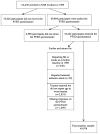Trauma Exposure and Posttraumatic Stress Disorder Symptoms Predict Onset of Cardiovascular Events in Women
- PMID: 26124186
- PMCID: PMC4519406
- DOI: 10.1161/CIRCULATIONAHA.114.014492
Trauma Exposure and Posttraumatic Stress Disorder Symptoms Predict Onset of Cardiovascular Events in Women
Abstract
Background: Psychological stress is a proposed risk factor for cardiovascular disease (CVD), and posttraumatic stress disorder (PTSD), the sentinel stress-related mental disorder, occurs twice as frequently in women as men. However, whether PTSD contributes to CVD risk in women is not established.
Methods and results: We examined trauma exposure and PTSD symptoms in relation to incident CVD over a 20-year period in 49 978 women in the Nurses' Health Study II. Proportional hazards models estimated hazard ratios and 95% confidence intervals for CVD events confirmed by additional information or medical record review (n=548, including myocardial infarction [n=277] and stroke [n=271]). Trauma exposure and PTSD symptoms were assessed by using the Brief Trauma Questionnaire and a PTSD screen. In comparison with no trauma exposure, endorsing ≥4 PTSD symptoms was associated with increased CVD risk after adjusting for age, family history, and childhood factors (hazard ratio,1.60; 95% confidence interval, 1.20-2.13). Being trauma-exposed and endorsing no PTSD symptoms was associated with elevated CVD risk (hazard ratio, 1.45; 95% confidence interval, 1.15-1.83), although being trauma-exposed and endorsing 1 to 3 PTSD symptoms was not. After adjusting for adult health behaviors and medical risk factors, this pattern of findings was maintained. Health behaviors and medical risk factors accounted for 14% of the trauma/no symptoms-CVD association and 47% of the trauma/4+ symptoms-CVD association.
Conclusion: Trauma exposure and elevated PTSD symptoms may increase the risk of CVD in this population of women. These findings suggest that screening for CVD risk and reducing health risk behaviors in trauma-exposed women may be promising avenues for prevention and intervention.
Keywords: cardiovascular diseases; epidemiology; stress disorders, post-traumatic; women.
© 2015 American Heart Association, Inc.
Figures


Comment in
-
Trauma and Posttraumatic Stress Disorder: Emerging Risk Factors for Cardiovascular Disease in Women?Circulation. 2015 Jul 28;132(4):227-9. doi: 10.1161/CIRCULATIONAHA.115.017432. Epub 2015 Jun 29. Circulation. 2015. PMID: 26124184 No abstract available.
-
Letter by Durmaz et al Regarding Article, "Trauma Exposure and Posttraumatic Stress Disorder Symptoms Predict Onset of Cardiovascular Events in Women".Circulation. 2016 Feb 16;133(7):e400. doi: 10.1161/CIRCULATIONAHA.115.019196. Circulation. 2016. PMID: 26884626 No abstract available.
-
Response to Letter Regarding Article, "Trauma Exposure and Posttraumatic Stress Disorder Symptoms Predict Onset of Cardiovascular Events in Women".Circulation. 2016 Feb 16;133(7):e401-2. doi: 10.1161/CIRCULATIONAHA.115.020198. Circulation. 2016. PMID: 26884627 Free PMC article. No abstract available.
References
-
- Mozaffarian D, Wilson PW, Kannel WB. Beyond established and novel risk factors lifestyle risk factors for cardiovascular disease. Circulation. 2008;117:3031–3038. - PubMed
-
- Towfighi A, Zheng L, Ovbiagele B. Sex-specific trends in midlife coronary heart disease risk and prevalence. Arch Intern Med. 2009;169:1762–1766. - PubMed
-
- Rozanski A, Blumenthal JA, Davidson KW, Saab PG, Kubzansky L. The epidemiology, pathophysiology, and management of psychosocial risk factors in cardiac practice: the emerging field of behavioral cardiology. J Am Coll Cardiol. 2005;45:637–651. - PubMed
Publication types
MeSH terms
Grants and funding
LinkOut - more resources
Full Text Sources
Medical

